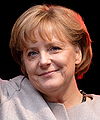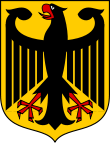- Next German federal election
-
Next German federal election 
2009 ← Between 1 September and 27 October 2013 All 598 seats (plus any overhangs) in the Bundestag
300 seats are needed for a majority


Leader Angela Merkel Sigmar Gabriel Philipp Rösler Party CDU/CSU SPD FDP Last election 239 seats, 33.8% 146 seats, 23.0% 93 seats, 14.6% 


Leader Gesine Lötzsch and Klaus Ernst Claudia Roth and Cem Özdemir Party The Left Green Last election 76 seats, 11.9% 68 seats, 10.7%
Incumbent Chancellor
Angela Merkel
CDU/CSUGermany 
This article is part of the series:
Politics and government of
GermanyConstitutionExecutiveLegislatureJudiciaryDivisions- States (Länder)
- Administrative regions
(Regierungsbezirke) - Districts (Kreise)
- Collective municipalities
- Municipalities (Gemeinden)
ElectionsForeign policy
The next German federal election will be an election to determine the 598 (or more) members of the 18th Bundestag, the federal parliament of Germany.[1] If it is a regular election, it will be held on a Sunday or holiday between 1 September and 27 October 2013. However, it might be held earlier under certain or later under exceptional circumstances.
In the last federal election in 2009, the Christian Democratic Union (CDU); its Bavarian sister party, the Christian Social Union (CSU); and the Free Democratic Party (FDP) won the election with Angela Merkel as Chancellor and Guido Westerwelle as Vice-Chancellor. The Social Democratic Party (SPD) however suffered its worst defeat, SPD leader Frank-Walter Steinmeier conceded[2] and announced his intention to become head of the opposition in the Bundestag.[3]
Contents
Date
The date of the next German federal election is governed by the constitution, the Basic Law, and the Federal Election Law (Bundeswahlgesetz).
Article 39 of the Basic Law states that the Bundestag shall be elected between 46 and 48 months after the beginning of the legislative period. As the 17th Bundestag convened on 27 October 2009, the next election will be scheduled between 27 August and 27 October 2013. As the Federal Election Law states that the election day must be a Sunday or public holiday, the dates of 1, 8, 15, 22, 29 September and 3 (Day of German Unity), 6, 13, 20 or 27 October would be within the scope of the Basic Law and election law.
Usually, to avoid school holidays, a date in late September is usually chosen; this would make 22 or 29 September 2013 the most likely dates.
The Basic Law provides for three possibilities to shorten or prolong the legislative period, and therefore move election day, which have rarely or never been used.
In case of an imminent or ongoing attack on Germany the Federal President is to declare the Case of Defence (article 115a of the Basic Law). In this case, the legislative period ends six months after the end of the Case of Defence (article 115h).
The more probable cases of shortening the legislative period are provided for in articles 63 and 68 of the Basic Law. The former states that the Federal President may (or may not) dissolve the Bundestag if during a vacancy in the office of Federal Chancellor the Bundestag fails to elect a new Chancellor with a majority of votes within fourteen days after the Federal President proposing a new Chancellor. The latter article allows the Federal Chancellor to ask the Federal President to dissolve the Bundestag after the Chancellor has lost a vote of confidence in the Bundestag. The President is once again free to choose whether to dissolve the Bundestag or not.
Of these three possibilities of changing the legislative period of a Bundestag, only the dissolution according to article 68 has been used in practice (1972, 1983 and 2005).
In case of a dissolution the snap election must take place within sixty days. During the Case of Defence the dissolution of the Bundestag is not possible.
Electoral system
In general, the Bundestag is elected using a mixed member proportional system. Voters have two votes: With their first they elect a member of Bundestag for their constituency, with the second they vote for a party. The seats in the Bundestag are generally distributed according to the second (party) votes. Until 2009, a party who won more districts in a given state than it was entitled to according to the number of second votes it received in that state could keep these "overhang" seats.
This electoral system must be changed under an order of the Federal Constitutional Court. The court stated that a provision in the Federal Election Law which makes it possible for a party to lose seats due to more votes violates the constitutional guarantee of the electoral system being equal and direct.[4]
This change should have been made by 30 June 2011. However, the government failed to present appropriate legislation in time to make this deadline.
Chancellor-candidates
Although the "chancellor-candidates" (Kanzlerkandidaten) play a very important role in election campaigns, their "office" is not regulated in any law. So it is up to each party to determine how (and if at all) to name a "chancellor-candidate".
The SPD names a chancellor-candidate while the CDU and the CSU name a common one. The smaller Bundestag parties (FDP, Left and Greens) usually[5] do not name a chancellor-candidate as it is very improbable for such a candidate to actually be elected chancellor. They instead name one or two persons (Spitzenkandidaten) who are to become the faces of that party's campaign. Fringe parties often name a chancellor-candidate although there is nearly no chance for them to win seats in the Bundestag, not to speak of their candidate to become chancellor.
While a sitting chancellor is usually named chancellor-candidate for his or her own party, the main opposition party's process to determine their chancellor-candidate differs. Most times, such a person is determined in an inner party circle and then anointed in a party convention.
As the CDU/CSU is the main government party, CDU chairwoman (and incumbent chancellor) Angela Merkel is unlikely to be challenged as chancellor-candidate unless she decides not to seek that post. In the SPD, the situation is a bit less clear: Usually, the party chairman (in this case, Sigmar Gabriel) and the parliamentary party chairman (Frank-Walter Steinmeier) are considered to be among the front runners for nomination. And so are ministerpresidents: during the 16-year chancellorship of Helmut Kohl, the SPD nominated a former Berlin Mayor and four sitting ministerpresidents (govenors) against him. At the moment, Peer Steinbrück, Minister of Finance during the 2005–2009 grand coalition and now a backbencher, is doing extremely well in opinion polls as he had gained reputation during the financial crisis.
Gabriel, Steinmeier and Steinbrück all have a bad electoral record as they all had lead their party into painful defeats in state or general elections (Gabriel and Steinbrück lost their inherited ministerpresident offices in 2003 and 2005, Steinmeier failed as a chancellor-candidate in 2009).
Polls
In Germany, there are regular polls during the whole of the legislative period. Current polls as of September 2011 suggest that, were the next election to take place the next Sunday, Chancellor Merkel's CDU/CSU would be the first party with 31% of the vote, the Social Democrats would win 29%, the Greens 19%, the Left 9% and the Free Democratic Party would stay off the bundestag with about 4% of the votes cast. Every poll suggests that SPD and Greens, partners in the 1998–2005 Schröder government, would be in reach of getting a majority of seats together.[6]
Polls
West and East
Institute Date CDU/CSU SPD GREEN FDP LINKE Others 2009 election 27 September 2009 33.8% 23% 10.7% 14.6% 11.9% 6% Forsa 2 February 2011 36% 22% 21% 5% 9% 7% Infratest dimap 3 February 2011 36% 25% 19% 5% 8% 7% Infratest dimap 6 February 2011 35% 27% 17% 5% 10% 6% Forsa 9 February 2011 36% 22% 20% 5% 10% 7% Forschungsgruppe Wahlen 11 February 2011 36% 27% 17% 5% 9% 6% Emnid 13 February 2011 34% 25% 19% 6% 10% 6% Infratest dimap 14 February 2011 35% 26% 19% 5% 9% 6% Forsa 16 February 2011 36% 22% 19% 5% 11% 7% GMS 18 February 2011 34% 26% 19% 5% 10% 6% Infratest dimap 18 February 2011 37% 25% 18% 5% 8% 7% Emnid 20 February 2011 35% 25% 19% 6% 9% 6% Forsa 23 February 2011 36% 23% 18% 5% 10% 8% Allensbach 23 February 2011 36% 28.5% 16.5% 6.5% 7.5% 5% Infratest dimap 24 February 2011 35% 27% 17% 6% 8% 7% Forschungsgruppe Wahlen 25 February 2011 36% 29% 15% 5% 9% 5% Emnid 27 February 2011 35% 28% 16% 6% 9% 6% Forsa 2 March 2011 34% 27% 16% 5% 10% 8% Emnid[7] 6 March 2011 33% 29% 15% 7% 9% 7% Forsa[8] 9 March 2011 36% 26% 16% 5% 10% 7% Infratest dimap[9] 12 March 2011 35% 28% 15% 6% 9% 7% Emnid[10] 13 March 2011 35% 28% 15% 6% 10% 6% Forsa[11] 16 March 2011 36% 26% 15% 6% 10% 7% Forsa[12] 16 March 2011 36% 26% 18% 5% 9% 6% Allensbach[13] 16 March 2011 36.5% 29% 15% 6.5% 8% 5% Infratest dimap[14] 18 March 2011 35% 28% 20% 5% 7% 5% Emnid[15] 20 March 2011 34% 28% 18% 5% 9% 6% GMS[16] 21 March 2011 34% 27% 20% 5% 8% 6% Forsa[17] 23 March 2011 33% 25% 20% 5% 8% 8% Infratest dimap[18] 24 March 2011 35% 27% 21% 5% 7% 5% Emnid[19] 27 March 2011 34% 27% 20% 4% 9% 6% Forsa[20] 30 March 2011 33% 25% 21% 5% 8% 8% Forschungsgruppe Wahlen[21] 1 April 2011 34% 28% 19% 5% 8% 6% Emnid[22] 3 April 2011 33% 26% 23% 5% 8% 5% Forsa[23] 6 April 2011 30% 23% 28% 3% 9% 7% Infratest dimap 7 April 2011 33% 27% 23% 5% 7% 5% Emnid 10 April 2011 33% 25% 24% 4% 8% 6% Emnid 13 April 2011 30% 24% 27% 4% 8% 7% Infratest dimap 15 April 2011 33% 26% 24% 4% 8% 5% Forschungsgruppe Wahlen 15 April 2011 34% 27% 23% 4% 7% 5% Emnid 17 April 2011 32% 23% 24% 5% 9% 7% Forsa[24] 27 April 2011 31% 21% 28% 4% 8% 8% Emnid[25] 1 May 2011 34% 24% 24% 4% 8% 6% Forsa[26] 4 May 2011 31% 21% 28% 4% 8% 8% Infratest dimap[27] 5 May 2011 35% 26% 23% 4% 7% 5% Forschungsgruppe Wahlen[28] 6 May 2011 33% 29% 21% 4% 7% 5% Forsa[29] 19 August 2011 32% 26% 21% 5% 8% 8% Forsa[30] 26 August 2011 33% 25% 21% 5% 9% 7% Forsa[31] 14 September 2011 31% 29% 19% 4% 9% 8% Forsa[32] 20 September 2011 31% 28% 20% 3% 9% 9% Emnid[33] 2 October 2011 32% 28% 17% 4% 7% 12% Institute Date CDU/CSU SPD GREEN FDP LINKE Others 2009 election 27 September 2009 33.8% 23% 10.7% 14.6% 11.9% 6%
WestInstitute Date CDU/CSU SPD GREEN FDP LINKE Others Infratest dimap[34] 3 February 2011 37% 26% 21% 5% 4% 7% Infratest dimap[35] 14 February 2011 36% 27% 21% 5% 5% 6% Allensbach[36] 18 February 2011 39% 27% 19% 5% 4% 6% Infratest dimap[37] 24 February 2011 37% 29% 18% 6% 4% 6% Favorite coalition
Institute Date CDU/FDP SPD/GREENS CDU/SPD CDU/GREENS Emnid[38] 1 April 2011 10% 32% 23% 15% Chancellor
Institute Date Merkel Steinmeier Trittin Künast Kretschmann Roth Özdemir Gabriel Forsa[39] 2 March 2011 43% 29% – – – – – – Forsa 9 March 2011 44% 29% – – – – – – Forsa 16 March 2011 40% 31% – – – – – – Forsa 16 March 2011 40% 32% – – – – – – Forsa[40] 14 April 2011 38% 32% – – – – – – Forsa[41] 14 April 2011 – – 12% 15% 12% 11% 10% – Forsa[42] 30 March 2011 39% 35% – – – – – – Forsa[43] 19 April 2011 51% – 28% – – – – – Forsa[44] 19 April 2011 52% – – 27% – – – – Forsa[45] 19 April 2011 45% 39% – – – – – – Forsa[46] 19 April 2011 49% – – – – – – 22% Forsa[47] 19 April 2011 39% 35% – – – – – – References
- ^ "Der Wahltermin für die Bundestagswahl 2009". Der Bundeswahlleiter. http://www.bundeswahlleiter.de/de/bundestagswahlen/BTW_BUND_09. Retrieved 5 January 2009.
- ^ "Merkel's rival concedes defeat in German election". The Daily Telegraph (London). 27 September 2009. http://www.telegraph.co.uk/news/worldnews/europe/germany/6237210/Merkels-rival-concedes-defeat-in-German-election.html. Retrieved 20 May 2010.
- ^ "Steinmeier wird Oppositionsführer". Die Zeit. 27 September 2009. http://www.zeit.de/politik/deutschland/2009-09/spd-steinmeier-opposition.
- ^ Federal Constitutional Court decision on the Federal Election Law
- ^ The FDP named their chairman, Guido Westerwelle, chancellor-candidate in 2002.
- ^ A rather up-to-date compilation of poll results by wahlrecht.de
- ^ http://www.wahlrecht.de/umfragen/index.htm
- ^ http://www.wahlrecht.de/umfragen/index.htm
- ^ http://www.wahlrecht.de/umfragen/dimap.htm
- ^ http://www.wahlrecht.de/umfragen/dimap.htm
- ^ http://www.wahlrecht.de/umfragen/dimap.htm
- ^ http://www.wahlrecht.de/umfragen/dimap.htm
- ^ http://www.wahlrecht.de/umfragen/dimap.htm
- ^ http://www.wahlrecht.de/umfragen/dimap.htm
- ^ http://www.wahlrecht.de/umfragen/dimap.htm
- ^ http://www.wahlrecht.de
- ^ http://www.wahlrecht.de
- ^ http://www.wahlrecht.de
- ^ http://www.wahlrecht.de
- ^ http://www.wahlrecht.de
- ^ http://www.wahlrecht.de
- ^ http://newsticker.sueddeutsche.de/list/id/1135139
- ^ http://newsticker.sueddeutsche.de/list/id/1135139
- ^ "Grüne nur noch drei Prozentpunkte hinter Union". Reuters. 4 May 2011. http://de.reuters.com/article/domesticNews/idDEBEE7430A520110504.
- ^ http://www.wahlrecht.de/umfragen/index.htm
- ^ http://www.wahlrecht.de/umfragen/index.htm
- ^ http://www.wahlrecht.de/umfragen/index.htm
- ^ http://www.wahlrecht.de/umfragen/index.htm
- ^ http://www.welt.de/politik/deutschland/article13562154/FDP-schafft-die-Fuenf-Prozent-Huerde.html
- ^ http://www.zeit.de/politik/deutschland/2011-08/wahltrend-rtl-stern-umfrage
- ^ http://www.focus.de/politik/deutschland/wahltrend-spd-erreicht-besten-umfragewert-seit-drei-jahren_aid_665215.html
- ^ http://www.focus.de/politik/deutschland/wahltrend-spd-erreicht-besten-umfragewert-seit-drei-jahren_aid_665215.html
- ^ http://web.bild.de/dnl/afp-flash/politik/koalitionsrechner/index.html
- ^ http://www.wahlrecht.de/umfragen/dimap/west.htm
- ^ http://www.wahlrecht.de/umfragen/dimap/west.htm
- ^ http://www.wahlrecht.de/umfragen/dimap/west.htm
- ^ http://www.wahlrecht.de/umfragen/dimap/west.htm
- ^ http://newsticker.sueddeutsche.de/list/id/1135139
- ^ http://www.stern.de/politik/deutschland/stern-rtl-wahltrend-gruen-gewinnt-1666585-infographic.html
- ^ http://www.stern.de/politik/deutschland/stern-rtl-wahltrend-roesler-kommt-gut-an-1674057-infographic.html
- ^ http://www.stern.de/politik/deutschland/stern-rtl-wahltrend-roesler-kommt-gut-an-1674057-infographic.html
- ^ http://www.stern.de/politik/deutschland/stern-rtl-wahltrend-roesler-kommt-gut-an-1674057-infographic.html
- ^ http://www.stern.de/politik/deutschland/stern-rtl-wahltrend-die-gruene-k-frage-1676004.html
- ^ http://www.stern.de/politik/deutschland/stern-rtl-wahltrend-die-gruene-k-frage-1676004.html
- ^ http://www.stern.de/politik/deutschland/stern-rtl-wahltrend-die-gruene-k-frage-1676004.html
- ^ http://www.stern.de/politik/deutschland/stern-rtl-wahltrend-die-gruene-k-frage-1676004.html
- ^ http://www.stern.de/politik/deutschland/stern-rtl-wahltrend-die-gruene-k-frage-1676004-infographic.html
External links
- Official voting results from the Federal Returning Officer
- Spiegal Online Poll Barometer
- Opinion poll tracker with data
- Opinion poll tracker with graph and weekly average
- The Candidates
 Elections in Germany
Elections in GermanyParliamentary elections 1848 · 1867 (Feb) · 1867 (Aug) · 1868 · 1871 · 1874 · 1877 · 1878 · 1881 · 1884 · 1887 · 1890 · 1893 · 1898 · 1903 · 1907 · 1912 · 1919 (National Assembly) · 1920 · 1924 (May) · 1924 (Dec) · 1928 · 1930 · 1932 (July) · 1932 (Nov) · 1933 (Mar) · 1933 (Nov) · 1936 · 1938 · 1949 · 1953 · 1957 · 1961 · 1965 · 1969 · 1972 · 1976 · 1980 · 1983 · 1987 · 1990 · 1994 · 1998 · 2002 · 2005 · 2009 · nextPresidential elections European elections Referendums 1926 · 1929 · 1933 · 1934 · 1936 · 1938See also: Baden-Württemberg · Bavaria · Berlin · Brandenburg · Bremen · Hamburg · Hesse · Lower Saxony · Mecklenburg-Vorpommern · North Rhine-Westphalia · Rhineland-Palatinate · Saarland · Saxony · Saxony-Anhalt · Schleswig-Holstein · Thuringia · East GermanyCategories:- Federal elections in Germany
- Future elections in Germany
- 2013 elections in Europe
Wikimedia Foundation. 2010.

